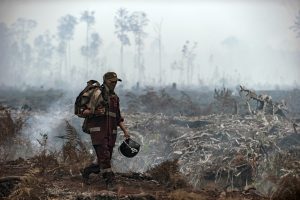2020 was supposed to be a landmark year for global climate and biodiversity. The United Nations Climate Talks, originally scheduled for November in Scotland, were set to be the most important since the historic 2015 conference that led to the Paris Agreement. Similarly, the Convention on Biological Diversity was set to meet in Kunming, China in October, with the aim of putting forward the next series of goals to replace the much maligned Aichi targets.
Southeast Asian nations were to play a key role in both meetings. The region has rapidly growing carbon emissions, led by countries like Vietnam, Indonesia, and the Philippines, due to the expansion of coal-fired power generation and petroleum-based transportation. Moreover, deforestation and still-regular fires contribute to both climate change (due to land-based emissions) and biodiversity loss, as they reduce the habitat for numerous plant and animal species. While expecting developing markets to take action on their own was unlikely, there was hope that funding mechanisms like REDD+, aimed at incentivizing forest protection, and the Green Climate Fund could be expanded and help the region meet climate and biodiversity goals. Environmentalists increasingly fear that delay could be catastrophic.
“The unfortunate truth is that any delay in action… will mean those enduring the worst impacts of climate change now risk having to wait even longer for already overdue real solutions and finance they so desperately need and are owed,” says Rachel Rose Jackson, director of climate research and policy at Corporate Accountability, an NGO based in the United States.
As it turned out, delay was inevitable, as 2020 was fated to be memorable for a very different reason. Both conferences were postponed due to a pandemic that itself has strong connections to environmental health, with many scientists connecting the pathogen’s emergence in Wuhan, China, to both wildlife trafficking and deforestation. But for Southeast Asia, instead of raising awareness of the need to better protect landscapes and crack down on wildlife trafficking, there are growing concerns that the pandemic and the resulting economic downtown could result in greater destruction, amid both development-focused stimulus across the region and also growing stress on nature due to increasingly impoverished rural communities.
Southeast Asia encompasses one of the world’s three major biodiversity and tropical landscapes, along with the South American Amazon and African Congo regions. Six of the world’s 25 biodiversity hotspots are in the region, which contains an astounding 20 percent of the planet’s vertebrate and plant species. Compared to other hotspots, Southeast Asia is far more densely populated, with a population of over 800 million – more than the Amazon and Congo combined.
Add in the fact that nearly every country in the region is low or middle income, this means that, for years, the environment has often been sacrificed for economic growth. Corruption is a factor too, with the region scoring poorly on metrics like Transparency International’s Corruption Perceptions Index.
Factor everything together, and the record is bleak – even before the pandemic.






























